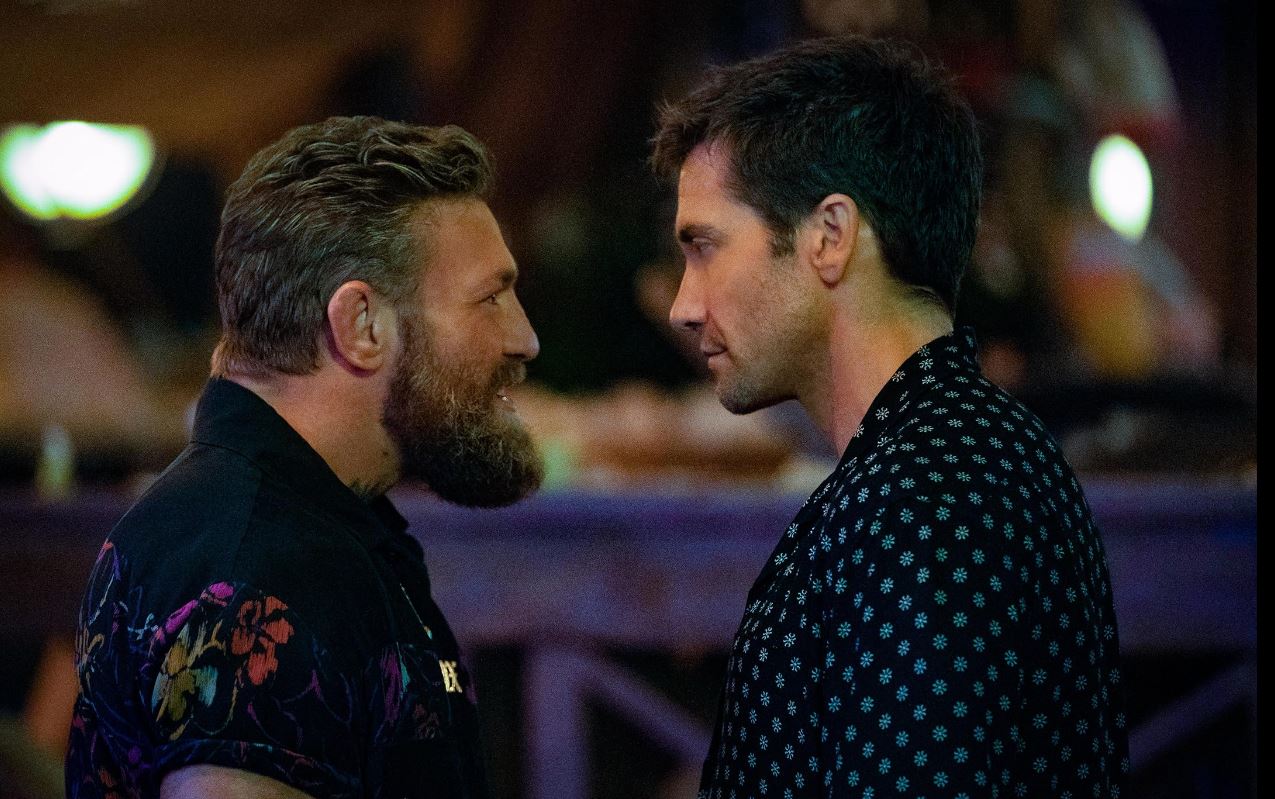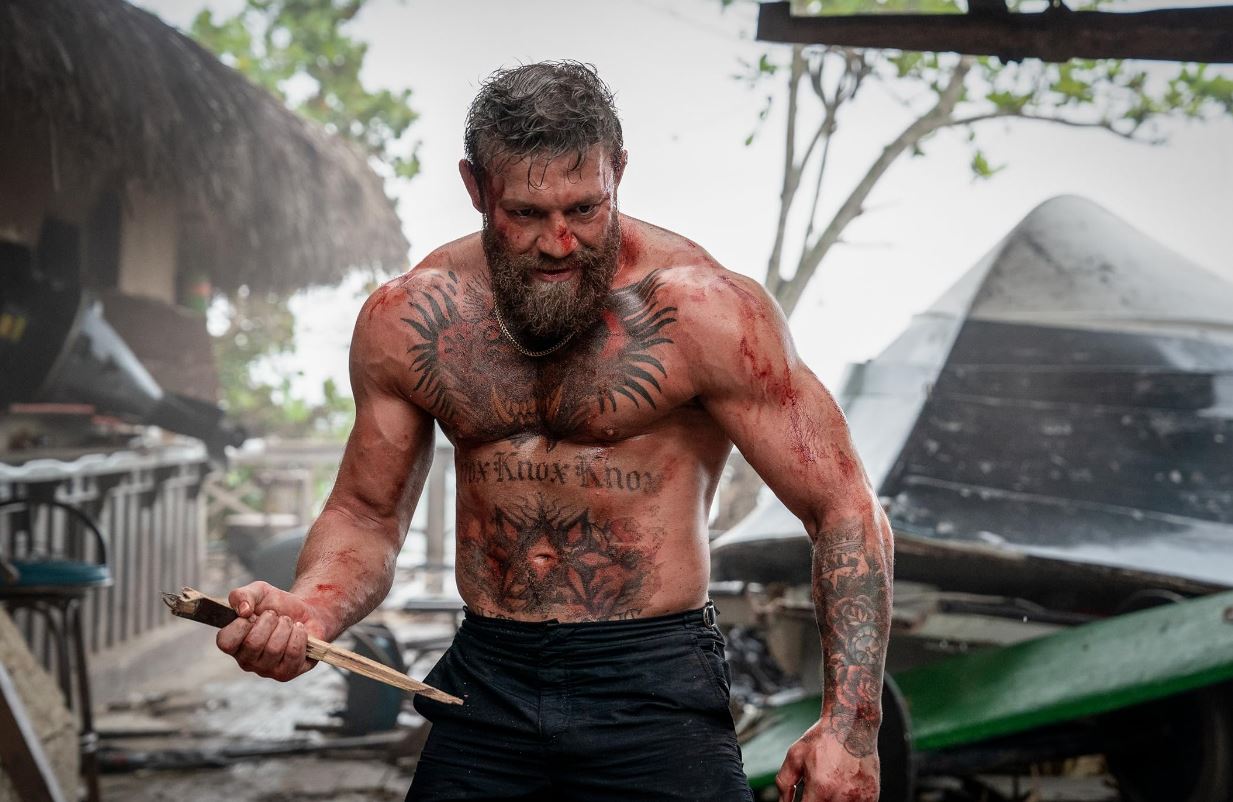I’m not surprised that someone wanted to remake Road House. The part of me that found a giddy satisfaction from Rowdy Herrington’s Midwestern tough-guy antics wants to protest, but contrary to its success at the box office, the 1989 original was deemed a terrible movie upon arrival. It’s a bit daring to revisit a misunderstood classic as opposed to riding the coattails of ’80s nostalgia, and if director Doug Liman had set out to do right in this “reimagined” version, then that’s admirable. I can also commend that this film isn’t a copy + paste function of Patrick Swayze’s coolheaded demeanor; instead, we have Jake Gyllenhaal, who is inconsistent as a character hurling between dead man walking, tough man punching, and sad man regretting.
This year’s Road House centers around The Road House located in a fictional Floridian town called Glass Key. Manned by Frankie (Jessica Williams) after her uncle passed away, the Road House resembles a mutt tiki-dive bar-restaurant, set to a revolving door of live bands playing behind a chain link fence and indistinguishable clientele (tourists or locals, young partygoers or retirees?). Frankie decides to seek security protection from the rowdy bikers who have a passion for destroying this establishment every night. She lends hope in Dalton (Gyllenhaal), a former UFC fighter with a mysterious past. The mystery might have worked better back in 1989 without the Internet, but as people come to witness Dalton’s special set of skills in action, a YouTube search reveals an infamous moment in his career that placed his opponent in critical injury.
As mentioned before, Gyllenhaal’s Dalton is a little confusing to follow. He’s enamored by the weekly 5-grand paycheck, but where he finds the internal motivation to teach others how to fight is unknown to me. Swayze’s Dalton is believable when he upholds standards in customer service and managerial skills. While both men resist the temptation to pulverize a man while trying to be cool and collected, Gyllenhaal’s backhanded concern is completely off-putting. It could be also an age thing, but Swayze’s portrayal of organizational skill was such an alluring presence in a film that could have been otherwise been dinged as grimy roughhousing. Herrington’s tight control of his scenes emulated Swayze’s cool and collected control throughout the film. Liman is going for all-brawls, which in the process loses its grip when the scenes get out of hand (controversially, the worst characters are the boats).
However, it’s imperative to share that the best part of the film arrives around the 54-minute mark, where Conor McGregor is introduced by walking naked to a market, stealing a man’s suit, and setting said market on fire. McGregor is not the boss — characters played by Billy Magnussen and Joaquim de Almeida probably rank higher in the Glass Key mob operations — but he is the villain to watch out for. Stunt casting can be hit or miss, but I’m honestly shocked that we have not let this man act before.
While the film loses identity from its convoluted plot, McGregor’s chaos is probably the one of the few things that make sense. As his first on-screen role as Knox (which audiences may be reminded by his name tattooed three times over his stomach), one might feel the need to comment on his acting — and to that, I’d argue that McGregor is probably not acting! He is The Notorious for a reason, and it’s apparent how the center of the room’s gravity pulls towards him whenever he walks into a room. Carrying an unpredictable intimidation to the likes of Bolo Yeung, McGregor is very much believable as a man of the lawless.
Unfortunately, you have to endure the other parts that make up the whole of Road House before you get to a scene where Knox crashes a car into a tree to park it. Recognizable faces like Lukas Gage and Darren Barnet are relegated to unmemorable lines while character consideration, like Daniela Melchor’s role as the town’s ER doctor, is tossed by the beachside. Some of the camera work is dedicated to the action, following the circular motion of a body being hurled across a table (one trick that comes into mind is the flash-switch from watching Dalton and Knox fight to seeing Dalton’s POV of facing a zoinked McGregor, a scenario that alpha-males may fantasize about), but largely undermined by the lack of depth behind all of the foolishness. Road House seems like Jason Statham’s role to lose, but utilizing Gyllenhaal for the pre-emptive notion that it’s supposed to be deeper than The Beekeeper (a batshit vehicle in its own fun way) misses the truth where they are in the same weight class. One of them just knows that they’re in on the joke.
Road House
2024
dir. Doug Liman
121 min.
Streaming on Amazon Prime Friday, 3/22



